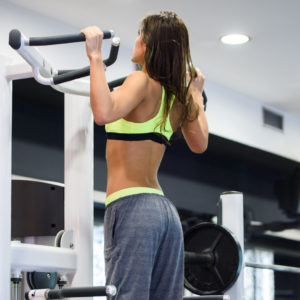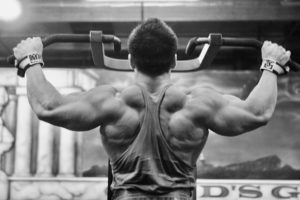The Truth About Chin-up Machines

How to best train your upper back muscles for strength and mass
Strength Sensei CP
Chin-up machines have become standard resistance training equipment in commercial gyms. But are they a good substitute for conventional chin-ups? Short answer: No.
I’ve always been a fan of chin-ups over pulldowns to develop strength and hypertrophy in the upper back, especially for sports performance. I say this because you must pull the body around the bar with chin-ups, which requires the abdominal muscles to work hard and involves other muscles that stabilize the upper back. With pulldowns, you pull the bar around the body, which is much easier and requires little stability. This difference explains why there is little carryover from pulldowns to chin-up performance; however, those who are good at chin-ups will be good at pulldowns. In fact, I’ve seen guys who can use the entire weight stack on pulldowns but will struggle trying to perform a single chin-up.
To be clear, I don’t have a problem with occasionally performing pulldowns, especially for increasing the training volume in a specialization phase designed to increase muscle mass in the lats. One way I like to design these lat-building workouts is to perform chin-ups or chin-up variations first, followed by pulldown variations that work the lats from different angles. Here is an example, organized in a tri-set format:
A1. Chin-up, Mid-Grip, 3 x 6-8, 30X0, rest 10 seconds
A2. Lat Pulldown, Twin-Handle, Parallel-Grip, 3 x 8-10, 30X0, rest 10 seconds
A3. Lat Pulldown, 45-Degrees, 3 x 10-12, 20X0, rest 120 seconds

Chin-ups, and their many variations, are great mass builders for the upper back. (Miloš Šarčev photo)
One variation of pulldowns that can cause issues with beginners, especially those with rounded shoulders, is the behind-the-neck lat pulldown. This exercise can cause adverse stress on the anterior capsule of the glenohumeral joint, leading to joint laxity. These individuals will often benefit from performing exercises for the external rotators of the shoulders. Further, many lat pulldown machines do not allow the pulldown bar to be vertically aligned with the shoulders, forcing you to lean forward to perform the movement. Corrective exercise expert Paul Chek has written extensively on the problems with behind-the-neck lat pulldown, so I would check out his material if you want to learn more about this subject.
The key to improving chin-up strength is patience, as the law of repeated efforts will eventually enable you to increase your chin-up strength. In other words, use low reps and multiple sets. Another method is eccentric training.
You are stronger during an eccentric contraction than a concentric contraction (that is, you can lower more weight than you can lift). For chin-ups, step onto a high platform so you can position your chin over the bar; slowly lower your body. When you can lower yourself under control for 30 seconds, you should be able to perform one chin-up with good form.
Machines have their place in an athlete’s training and can be especially valuable for improving body composition and packing on muscle. However, if you want to get the most out of your workouts, skip the chin-up machines and go back to the basics with chin-ups.
